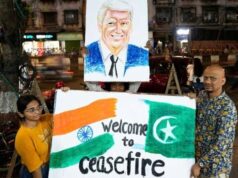Indians now loving Indian single malts over Scotland’s Bottles

India is now becoming a maker of world beater brands of Whisky and wine rather than being just a consumer of imported ones. Indian single malts are reshaping the country’s INR 275 Crores spirits market.
Whereas beer dominates the sales all over Asian markets, it is whisky in India. Also once ruled by imported Scotch from British ruled Scotland, now Indians are gravitating towards own globe beating brands. Analysts say that Global awards to Indian brands, increased affluence and a mass of drinkers trying new Indian brands have changed the Indian liquor market.
Established global brands such as Glenlivet, made by France’s Pernod Ricard, and Talisker by Britain’s Diageo now have to fight for shelf space with local rivals Indri, Amrut and Radico Khaitan’s Rampur.
Indian Scotch drinkers for years are now increasingly going for Indian malts for self and for gifts during festive seasons. Indian whisky now gives a sense of national pride – and goes well with Indian food. “Nothing beats Indian malts in pairing with our kind of food, which is spicy. I love it.” Said a whisky lover.
Indri’s $421 Diwali Collector’s Edition won the “Best in Show” at the Whiskies of a World Awards blind tasting in San Francisco in August, beating Scottish and U.S. rivals.
Oak casks, once used to store bourbon and wine, are stacking up in a distillery near New Delhi, Indian single malt Indri, recently named the world’s best whisky. These casks filled with ageing whisky churn out almost 10,000 bottles a day of Best Indian whiskies.
Sugarcane and mustard fields, not peat bogs, ring the distillery, where the two-year-old Indian brand’s owner Company is ramping up production and building a three-hole golf course to lure connoisseurs and tipplers in the whisky-loving nation.
Indri’s $421 Diwali Collector’s Edition won “Best in Show” at the Whiskies of a World Awards blind tasting in San Francisco in August, beating Scottish and U.S. rivals.
In response to the drink-India trend, global brands that have focussed on single malts aged in Scotland are looking to Indian whiskies to tap the boom in one of the world’s biggest whisky markets.
Now Pernod has been forced on the backfoot. With Bollywood stars and Indian music, Pernod on Wednesday uncorked its first made-in-India single malt, INR 4000 Longitude 77, with plans to expand sales to Dubai and then the rest of the world.
“We are extremely bullish about this category. It has seen unprecedented growth,” said Kartik Mohindra, Pernod India’s chief marketing officer.
Diageo, a big rival of Pernod, last year launched its first Indian single malt, Godawan – named after a large, endangered Indian bird – that sells in five foreign markets, including the United States.
“We seem to be moving from imported whisky in India to Indian whisky – within India and globally,” said Vikram Damodaran, Diageo’s India chief innovation officer.
Pernod’s Glenlivet, long India’s top-selling single malt, despite growing 39% by volume last year, was dethroned last year by Amrut, which spiked 183%.
Indian single malts soared 144% in 2021-22, beating the 32% growth in Scotch, data from IWSR Drinks Market Analysis shows. For the period until 2027, it predicts, consumption of Indian malts is set to grow 13% a year compared to Scotch at 8%.
Indri maker Piccadily Distilleries hopes to expand capacity by 66% to 20,000 litres a day by 2025, reaching beyond the 18 foreign markets that make up 30% of its sales, said founder Siddhartha Sharma.
It plans to double the number of casks to 100,000 at the sprawling distillery in a farm belt 160 km north of India’s capital.
The local brands are not cheap: Indri starts at INR 3000 a bottle, Amrut at INR 3500 and Rampur INR 5600 in shops near New Delhi. In comparison, Pernod’s Glenlivet retails from INR 3400 to INR 10000, depending on age.
At the Longitude 77 launch, Pernod served CEOs, diplomats, celebrity chefs and other invited guests the new single malt and cocktails made with it, combined with local ingredients like Kashmiri saffron and Alphonso mangoes.
Radico expects Rampur sales to double each year and will focus more on expanding the domestic market, as foreign sales contribute 75% of its business, said Sanjeev Banga, president of international business.
The biggest endorsement of the category, he said, “is that you have both Diageo and Pernod coming up with an Indian single malt.”
“Otherwise, they were only talking about their mainstream foreign brands,” Banga said. “They realise this is a category of the future.”




